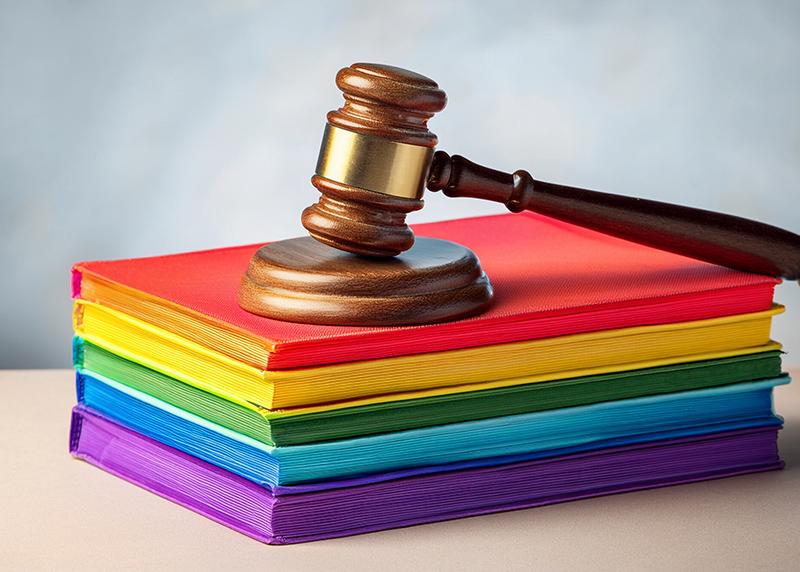Federal Judge Guts Iowa’s ‘Don’t Say Gay’ Law
The ruling strikes down Iowa book ban and LGBTQ classroom restrictions as unconstitutional.
By John Riley on May 25, 2025 @JRileyMW

A federal judge issued an order blocking parts of Iowa’s anti-LGBTQ education law, which has been dubbed the “Don’t Say Gay” law by critics.
Provisions of the law, signed into effect by Gov. Kim Reynolds in May 2023, include a ban on books with “descriptions or visual depictions of a sex act” — except for approved scientific or health class texts, or religious texts like the Bible. The law also prohibits “any program, curriculum, test, survey, questionnaire, promotion, or instruction” that references sexual orientation or gender identity in K-6 classrooms.
Under the law, teachers and other school personnel are barred from making any “accommodation that is intended to affirm the student’s gender identity” without first receiving written permission from a students’ parents or legal guardian.
Teachers also must inform parents if a student asks to use a name or pronouns that do not match their assigned sex at birth.
The law was slated to go into effect on January 1, 2024, but the ACLU of Iowa and Lambda Legal filed a lawsuit on behalf of the LGBTQ nonprofit Iowa Safe Schools and seven Iowa students and their families who claim to be affected by the law, with the intent of stopping the state from enforcing it.
Publishing giant Penguin Random House filed a separate lawsuit on behalf of four authors whose works were censored under the ban. The state’s largest teacher’s union, the Author’s Guild, and four major publishers joined the lawsuit.
In December 2023, U.S. District Judge Stephen Locher, of the Southern District of Iowa, combined the two lawsuits. Locher later ruled that the book ban provision of the law likely violates the First Amendment, and that the prohibition on LGBTQ-related content in classrooms is unconstitutionally vague and overbroad.
The state appealed the decision, and the 8th U.S. Circuit Court of Appeals lifted the injunction, ordering the lower court to apply a new U.S. Supreme Court case in analyzing the parties’ arguments.
In March, Locher issued a temporary injunction stopping the state from enforcing the bans. On May 15, he issued a preliminary injunction that blocked some parts of the law while allowing other provisions to take effect, reports Little Village magazine.
Locher upheld the law’s ban on mandatory lessons or instruction to students in grades K-6 that includes “detailed explanations or normative views on ‘gender identity,’ or ‘sexual orientation.'” While that provision was championed as a way to erase LGBTQ-related content from the school curriculum, Locher said that for the provision to be constitutional, the ban must apply to all gender identities and sexual orientations.
“It does not matter whether the lessons or instruction revolve around cisgender or transgender identities or straight or gay sexual orientations,” Locher wrote. “All are forbidden.”
However, he found that teachers should not be punished for incidental, neutral references to sexual orientation or gender identity made within the context of a larger lesson. He also found that teachers may assign books or provide lessons to K-6 students involving characters or gender identities (cisgender or transgender) and sexual orientations (gay or straight) as long as those are not the primary focus of the lesson.
Locher warned that provisions of the law banning “programs” related to gender identity are overly broad, noting that, under a neutral reading of the law, banning anything gender identity-related “would mean the law bans ‘girls’ and ‘boys’ sports teams and any other classroom or extracurricular activity that recognizes and endorses gender identity.”
Locher blocked a provision of the law banning Gender-Sexuality Alliances and other student groups relating to gender identity or sexual orientation, saying students must be allowed to join such groups if they wish.
Locher noted that the law has prompted some school districts to remove LGBTQ symbols, such as Pride flags and safe space stickers, for fear that teachers could be prosecuted for exposing younger students to those symbols. Some teachers were even advised not to mention their same-sex partners within earshot of students. Locher found that such prohibitions violate the First Amendment.
Locher narrowed the law’s provision requiring written permission from parents before accommodating a student’s gender identity, finding it unconstitutionally vague because it does not define what constitutes an “accommodation.”
However, he did keep in place the “parental notification” provision of the law, requiring teachers to inform parents if their children request to be addressed using names or pronouns that don’t match those listed on their official school records.
Locher concluded that both the student and teacher plaintiffs could face “irreparable harm” if the provisions he blocked were allowed to remain in effect.
“This ruling acknowledges that Iowa students and teachers have experienced real harm from this law,” Nathan Maxwell, a senior attorney at Lambda Legal, said in a statement. “The court agreed with us that the latitude afforded the State to determine school curricula does not empower lawmakers to erase any mention of LGBTQ+ people altogether from schools.”
More from Metro Weekly:
Trump Agrees to Restore Deleted HIV, LGBTQ Health Webpages
Federal health webpages on HIV, LGBTQ issues were deleted under Trump orders erasing transgender identity and opposing DEI.
By John Riley on September 9, 2025 @JRileyMW
The Trump administration has agreed to settle a lawsuit by restoring webpages containing health- and science-related information, including resources on HIV and LGBTQ health issues, that had been deleted to comply with a series of executive orders issued by President Donald Trump.
Those orders sought to erase transgender identity from federal law, prohibited agencies from using the term "gender" in policy, and targeted diversity, equity, and inclusion programs across government and the private sector.
Other Trump orders targeted diversity, equity, and inclusion programs in both government and the private sector, and threatened to strip federal funding from events or organizations accused of promoting so-called "gender ideology."
Federal Judge Strikes Down Florida’s Book Ban Law
Court rules state’s expanded “Don’t Say Gay” provisions are unconstitutionally vague, violating the First Amendment and censoring acclaimed literature.
By John Riley on August 20, 2025 @JRileyMW
A federal judge in Florida has struck down major parts of the state's expanded "Don't Say Gay" law, ruling that its book banning provisions violate the First Amendment. Approved in 2023, the law not only restricted classroom discussions of LGBTQ identities but also made it easier for any county resident to demand the removal of books from school libraries.
Under the law, once a complaint was filed schools had five days to pull the contested book from shelves, making it unavailable while under review. Districts were required to set up procedures for handling complaints, but those rules were criticized for favoring would-be censors and sidelining parents who opposed bans.
Ulta Under Fire from Anti-LGBTQ Group Over Nonbinary Star Deal
The Family Research Council claims "Queer Eye" star Jonathan Van Ness mocks women and condemns Ulta Beauty for selling his hair products.
By John Riley on August 5, 2025 @JRileyMW
The Family Research Council is blasting Ulta Beauty for selling hair products from nonbinary reality star and hairstylist Jonathan Van Ness, best known for Netflix's Queer Eye, and for posting an Instagram video showing Van Ness in a multi-colored dress and white heels, "jumping and shrieking" with excitement as store employees unveil a display featuring a large poster of him.
The famously anti-LGBTQ group claims Van Ness' behavior mocks women and "what he perceives to be female behavior." It also notes that Ulta previously hosted a now-deleted podcast episode featuring transgender influencer Dylan Mulvaney, which it cites as further evidence the company promotes a caricatured view of femininity.
Support Metro Weekly’s Journalism
These are challenging times for news organizations. And yet it’s crucial we stay active and provide vital resources and information to both our local readers and the world. So won’t you please take a moment and consider supporting Metro Weekly with a membership? For as little as $5 a month, you can help ensure Metro Weekly magazine and MetroWeekly.com remain free, viable resources as we provide the best, most diverse, culturally-resonant LGBTQ coverage in both the D.C. region and around the world. Memberships come with exclusive perks and discounts, your own personal digital delivery of each week’s magazine (and an archive), access to our Member's Lounge when it launches this fall, and exclusive members-only items like Metro Weekly Membership Mugs and Tote Bags! Check out all our membership levels here and please join us today!
The Magazine
-
Most Popular
 D.C. Man Hurls Anti-Gay Slur in Logan Circle Assault
D.C. Man Hurls Anti-Gay Slur in Logan Circle Assault  DC Comics Cancels Red Hood Over Author’s Charlie Kirk Posts
DC Comics Cancels Red Hood Over Author’s Charlie Kirk Posts  Jimmy Kimmel Defeats George Santos’ Cameo Video Lawsuit
Jimmy Kimmel Defeats George Santos’ Cameo Video Lawsuit  Iowa Must Pay $85,000 to LGBTQ Students Expelled From Capitol
Iowa Must Pay $85,000 to LGBTQ Students Expelled From Capitol  Supreme Court Lets Trans Student Use Boys’ Bathroom
Supreme Court Lets Trans Student Use Boys’ Bathroom  Charlie Sheen Opens Up About Gay Encounters
Charlie Sheen Opens Up About Gay Encounters  Christina Aguilera Replaces Grindr’s Iconic 'Bloop' With Her Voice
Christina Aguilera Replaces Grindr’s Iconic 'Bloop' With Her Voice  Judge Rules Ohio Man Can Have 'GAY' License Plate
Judge Rules Ohio Man Can Have 'GAY' License Plate  House GOP Adds Anti-LGBTQ Amendments to Defense Bill
House GOP Adds Anti-LGBTQ Amendments to Defense Bill  Gay Porn Star Austin Wolf Pleads Guilty to Enticing a Minor for Sex
Gay Porn Star Austin Wolf Pleads Guilty to Enticing a Minor for Sex
 DC Comics Cancels Red Hood Over Author’s Charlie Kirk Posts
DC Comics Cancels Red Hood Over Author’s Charlie Kirk Posts  D.C. Man Hurls Anti-Gay Slur in Logan Circle Assault
D.C. Man Hurls Anti-Gay Slur in Logan Circle Assault  Jimmy Kimmel Defeats George Santos’ Cameo Video Lawsuit
Jimmy Kimmel Defeats George Santos’ Cameo Video Lawsuit  Christina Aguilera Replaces Grindr’s Iconic 'Bloop' With Her Voice
Christina Aguilera Replaces Grindr’s Iconic 'Bloop' With Her Voice  Judge Rules Ohio Man Can Have 'GAY' License Plate
Judge Rules Ohio Man Can Have 'GAY' License Plate  House GOP Adds Anti-LGBTQ Amendments to Defense Bill
House GOP Adds Anti-LGBTQ Amendments to Defense Bill  Bold & Beautiful Debuts Its First Gay Male Couple
Bold & Beautiful Debuts Its First Gay Male Couple  Iowa Must Pay $85,000 to LGBTQ Students Expelled From Capitol
Iowa Must Pay $85,000 to LGBTQ Students Expelled From Capitol  Polish Politician Leaves Far-Right Party for Intersex Woman
Polish Politician Leaves Far-Right Party for Intersex Woman  Whitman-Walker's Walk & 5K to End HIV is Saturday, Sept. 20
Whitman-Walker's Walk & 5K to End HIV is Saturday, Sept. 20
Scene
Metro Weekly
Washington's LGBTQ Magazine
P.O. Box 11559
Washington, DC 20008 (202) 527-9624
About Us pageFollow Us:
· Facebook
· Twitter
· Flipboard
· YouTube
· Instagram
· RSS News | RSS SceneArchives
Copyright ©2025 Jansi LLC.














You must be logged in to post a comment.